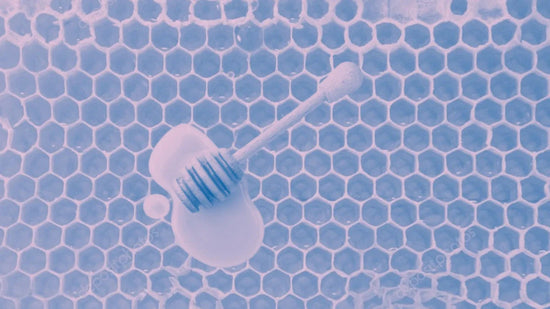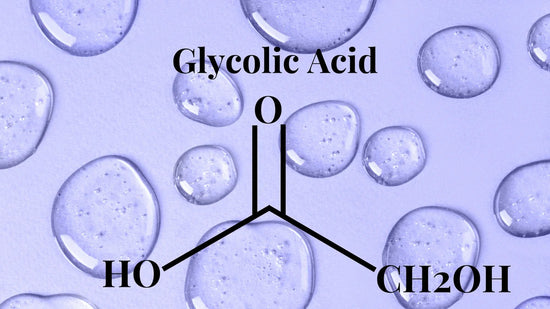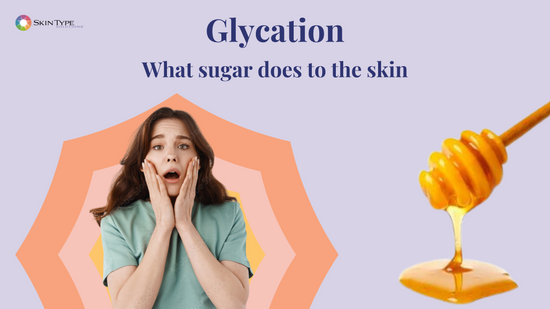Glycerin (Glycerol) in Skin Care
Glycerin (Glycerol) in skin care
Glycerin (glycerol) is one of the most popular moisturizing ingredients in skin care products.
It is a potent humectant with decades of research supporting its effectiveness in hydrating skin.
Studies have found that normal hydration of the skin requires the presence of glycerol. (5) It is one of the most important parts of healthy, hydrated skin.
If you have a dry skin concern, glycerin (glycerol) might be the perfect addition to your custom skin care regimen.
What is Glycerin in skin care?
Glycerin in skin care is a simple sugar alcohol present in most biologic life. The words glycerin and glycerol are interchangeable in skin care; they're the same thing.
Fats in the body are made partially of triglycerides, which are multiple glycerol molecules attached to one another. Therefore, glycerin can be synthesized from many kinds of animal fats. (3)
Plant fats also contain triglycerides, and some glycerin is sourced exclusively from plants. This means that some glycerin products are vegan and some are not.
Skin care companies are not required to label their glycerin as vegan or animal based. If you are looking for vegan glycerin products, some brands do write "vegetable glycerin" on their labels.
Keep in mind that if the label says "glycerin" or "glycerol," without mentioning vegetables, it could be animal based glycerin.

How does Glycerin work?
Glycerin is a unique moisturizer with several properties that make it a good moisturizing ingredient.
Glycerin's Humectant Properties
Glycerin is a humectant, meaning it draws water into itself. Humectants are one of the most common types of moisturizing ingredients in skin care. (9)
Studies have found that glycerin has particularly strong humectant properties among the competition, and assists in hydrating enzymes needed to break down the connective proteins between cells. (3)
Glycerin Passes through Aquaporin Channels
Glycerin has the fairly unique ability to navigate AQP-3 (aquaporin) channels. Aquaporin channels are structures that pass between individual skin cells; this means that glycerin can move between skin cells and get deep into the skin better than many other ingredients. Water is one of the only other common ingredients capable of using these AQP-3 pathways. (6)
Glycerin has been used for years in cosmetics for its known humectant properties, and the recent discovery that it can use AQP-3 channels means it is likely to be used for years to come. (8)

What are the benefits of Glycerin in skin care?
Like most humectants, the primary benefit of glycerin in skin care is as a moisturizing ingredient.
Studies have demonstrated the crucial role glycerol plays in skin hydration; the hydration of your stratum corneum (SC) (the outermost layer of skin) is directly related to your skin's glycerol levels. (2)
In one study comparing 16 moisturizing ingredient's efficacy across 394 subjects with dry skin, glycerin products were found to have by far the most profound hydrating effects. (3)
In addition, glycerin products were found to keep the skin hydrated for longer after application than other products, including the standard for preventing water loss, petrolatum. (3)
Because of glycerin's ability to navigate aquaporin channels, it is able to move between skin cells and create spaces for other ingredients to move between those cells. (4)
Side-effects
Humectants like glycerin are generally free from significant side effects, however there are a few considerations to make before you add a humectant to your skin care routine.
First, if you live in a dry climate and have dry skin, you should pair your glycerin products with occlusive moisturizers that prevent TEWL. Humectants bring moisture to the surface of your skin, and if the air is dry you will lose that moisture without an occlusive.
Second, if you are experiencing any kind of puffiness on your eyelids, humectants can actually worsen that puffiness.
Finally, lip balms without occlusive ingredients can result in TEWL as well; this can leave you feeling dependent on your lip balm for moisture. This has been called "lip balm addiction."
Keep these features of glycerin and other humectants in mind while you look for the perfect products for your skin type.

Is it safe?
Glycerin has been studied extensively for safety concerns, and is considered safe.
The Cosmetic Ingredient Review board (CIR) released a report on various glycerides and has provided their stamp of approval. (11)
Glycerin is rated 1-2 by the EWG.
Glycerin may be considered a clean ingredient if it is plant derived.
If need a humectant,moisturizing ingredient for your skin care routine, glycerin could very well be the right choice for you!
For specific skin conditions
Glycerin is one of the best, most common, and cheapest moisturizing ingredients on the market; it's great for skin conditions that benefit from a potent humectant and increased SC fluidity. (5,6)
In general, dry skin conditions like eczema, ichthyosis, psoriasis, and pruritis can all be treated with glycerin products. We recommend pairing glycerin with an occlusive ingredient such as an oil when using glycerin to treat eczema or psoriasis.
Besides dry skin conditions, glycerol is also useful for delivering other ingredients further into the skin. For this reason, you can often find glycerin in anti-aging and inflammation products. (4,10)
If you have a specific skin concern, be sure to take the best skin type quiz so you can shop for treatments by your Baumann Skin Type.
The best solution to any skin concern is having the right custom skin care regimen.
Eczema
Eczematic skin is, (to oversimplify), skin that has a hard time holding water, for that reason, ingredients that hydrate the skin are good for eczema.
If you are going to use a humectant like glycerin on eczema, be sure to include an occlusive ingredient so you don't lose all the accumulated moisture into the atmosphere.
The best eczema treatments include a combination of different kinds of ingredients with complimentary anti-inflammatory, barrier repairing, and hydrating properties.
If you have eczema, consider some of these cleansers to use in your routine!
For Wrinkles
While glycerin does not itself remedy aging skin or wrinkles, it can be useful for helping anti-aging ingredients interact with the skin.
Studies have found that using glycerin alongside ingredients which struggle to penetrate skin (glycolic acid was studied) makes a significant impact in absorption. (10)
Anti-aging ingredients typically are antioxidants, collagen or elastin stimulating, or exfoliating; glycerin is none of those things.
Glycerin does not perform any of those functions, so it is really just used as a hydrating delivery system for other ingredients in wrinkle treatments.
However, its immense ability to bind water helps temporarily puff up the skin and make fine lines look instantly better. The results are temporary.
This ability to plump up the skin makes glycerin a favorite ingredient to get "glass skin".

Glycerin vs Hyaluronic acid
Glycerin and hyaluronic acid are functionally similar ingredients, but they are have very different structures. There are a few notable differences between these two ingredients even though they're both humectants.
Of these two compounds, only glycerin is able to move through the AQP-3 (aquaporin) channels in the skin, meaning it is better at hydrating deep in the skin. (4)
Glycerin is a sugar-based alcohol, while hyaluronic acid is a glycosaminoglycan - a disaccharide (a different, more complex kind of sugar)
Glycerin is cheaper to synthesize than hyaluronic acid, meaning glycerin products tend to be more affordable.
As the word "acid" indicates, hyaluronic acid has a low pH, meaning it might be a better choice for low pH cleansers than glycerol.
Glycerin vs Polyglutamic acid
Polyglutamic acid is a chemical usually derived from food fermentation. It is related to the "umami" flavor compound glutamic acid. (MSG stands for mono-sodium glutamate.)
Because it is formed through fermentation, polyglutamic acid is harder and more expensive to synthesize than glycerin.
It is actually a far more potent humectant than glycerin and expresses anti-aging properties. (12) but it cannot use the aquaporin channels in the skin the way glycerin can.
Glycerin vs honey
Honey is a fascinating ingredient in skin care that varies in properties based on the flowers and bees it came from. In general, however, honey always contains glycerin. (13-15)
The glycerin in honey provides its notable moisturizing, humectant qualities.
Honey is a complexly composed ingredient, full of various phenols, flavonoids, fatty acids, and vitamins; it is acidic too.
Glycerin is a singular compound that serves a unique function as a humectant that can pass through AQP-3; honey is a broader ingredient that happens to contain glycerin.
Products
As one of the most popular moisturizing ingredients in all of skin care, there are no shortage of options for skin care products made with glycerin. It is found in varying amounts in the vast majority of products for dry skin. You can find our collection of products for dry skin here!
Before you choose your favorite, be sure to take our quiz and find your Baumann Skin Type. The best way to be sure the products you buy will work for you is to shop by your skin type!

Here are some of the best references on Glycerin in skin care:
- Chernosky ME. Clinical aspects of dry skin. J Soc Cosmet Chem. 1976;27:365-76.
- Choi EH, Man MQ, Wang F, Zhang X, Brown BE, Feingold KR, et al. Is endogenous glycerol a determinant of stratum corneum hydration in humans? J Invest Dermatol. 2005;125(2):288-93.
- Orth D, Appa Y. Glycerine. a natural ingredient for moisturizing skin. In Dry Skin and Moisturizers. Loden M, Maibach H, eds. Boca Raton, FL: CRC Press, 2000, p. 217.
- Orth D, Appa Y, Contard E, et al. Effect of High Glycerin Therapeutic Moisturizers on the Ultrastructure of the Stratum Corneum. Poster presentation at the 53rd Annual Meeting of the American Academy of Dermatology. New Orleans, LA. February, 1995:3-8.
- Fluhr JW, Mao-Qiang M, Brown BE, Wertz PW, Crumrine D, Sundberg JP, et al. Glycerol regulates stratum corneum hydration in sebaceous gland deficient (asebia) mice. J Invest Dermatol. 2003;120(5):728-37.
- Hara M, Ma T, Verkman AS. Selectively reduced glycerol in skin of aquaporin-3-deficient mice may account for impaired skin hydration, elasticity, and barrier recovery. J Biol Chem. 2002;277(48):46616-21.
- Hara M, Verkman AS. Glycerol replacement corrects defective skin hydration, elasticity, and barrier function in aquaporin-3-deficient mice. Proc Natl Acad Sci U S A. 2003;100(12):7360-5.
- Draelos ZD. Active agents in common skin care products. Plast Reconstr Surg. 2010;125(2):719-724.
- Mitsui T. Humectants. In New Cosmetic Science, Mitsui T, ed. New York, NY: Elsevier, 1997, p. 134.
- Mbituyimana, B., Mao, L., Hu, S., Ullah, M. W., Chen, K., Fu, L., ... & Yang, G. (2021). Bacterial cellulose/glycolic acid/glycerol composite membrane as a system to deliver glycolic acid for anti-aging treatment. Journal of Bioresources and Bioproducts, 6(2), 129-141.
- Writer, C. I. R. (2023). Safety Assessment of Diglycerin and Polyglycerin-3,-6, and-10 as Used in Cosmetics.
- Bajaj, I., & Singhal, R. (2011). Poly (glutamic acid)–an emerging biopolymer of commercial interest. Bioresource technology, 102(10), 5551-5561.
- Buba, F., Gidado, A., & Shugaba, A. (2013). Analysis of biochemical composition of honey samples from North-East Nigeria. Biochem Anal Biochem, 2(3), 139.
- Burlando, B., & Cornara, L. (2013). Honey in dermatology and skin care: a review. Journal of cosmetic dermatology, 12(4), 306-313.
- Abdul Malik N, Mohamed M, Mustafa MZ, Zainuddin A. In vitro modulation of extracellular matrix genes by stingless bee honey in cellular aging of human dermal fibroblast cells. J Food Biochem. 2020 Jan;44(1):e13098. doi: 10.1111/jfbc.13098. Epub 2019 Nov 20. PMID: 31746481.
















































Skin Type Solutions on
Hello, Faridah! Thank you for raising such an interesting concern. I want you to know that I have been looking into this question carefully to provide you with the best answer I can. While I myself do not practice Islam, this is what I have learned about haram vs halal skin care:
To directly respond to your thoughts on Glycerin, yes, absolutely you should be careful when sourcing glycerin products because glycerin can sometimes be sourced from animal fats (including pigs)! Usually, however, glycerin in skin care comes from plant sources.
In general, the “rules” I found online about haram ingredients seem to vary based on the scholar being questioned. Some scholars online have made claims that no products derived from animals that were slaughtered outside of traditional dhabihah are permissible to use even in skin care. This can include not only species, but methods of slaughter that are not halal. I have seen other scholars claim that only consuming certain animals is haram, (besides pigs which, as I understand, should never be touched at all by a muslim) but that certain insect dyes or snail based skin care might be halal.
I want to offer you the best advice I can for your skin and your cultural background, so here’s my recommendation for you:
Take our skin typing quiz here at Skin type solutions to find out what types of products are right for you, then, be sure to search our website for only vegan products. We do have a way to search for only vegan choices, and once you take our quiz you will be instructed on which are the best choices for your skin. Vegan skin care products are, as far as I understand, halal.
Thanks so much for your comment!
Faridah on
Hello. I am treating melasma currently. I have been incorporating tyrosinase inhibitors and staying away from saturated fatty acids. However, it’s harmattan in my country and i want to incorporate glycerin as well as petroleum jelly as occlusive. My question is whether those two increase melanin production in any way? Thank you
Faridah on
Hello. I am treating melasma currently. I have been incorporating tyrosinase inhibitors and staying away from saturated fatty acids. However, it’s harmattan in my country and i want to incorporate glycerin as well as petroleum jelly as occlusive. My question is whether those two increase melanin production in any way? Thank you